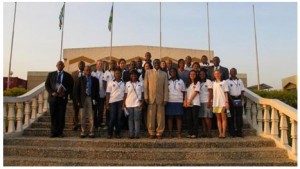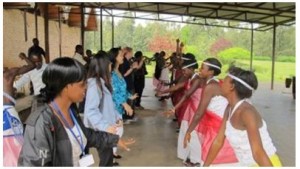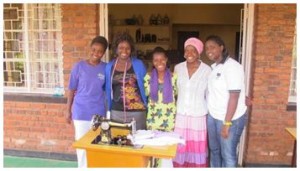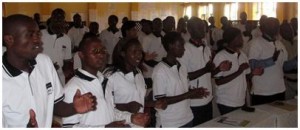Never Again Rwanda
Never Again Rwanda (NAR) is a member of the Global Coalition for Conflict Transformation, comprised of organizations committed to upholding the Principles of Conflict Transformation.
Suggested Reading |
Conflict Background |
GCCT |
By Never Again Rwanda
NAR was established to address the long history of conflict in Rwanda, particularly the devastating 1994 genocide in which one million were murdered in just one hundred days. There are important lessons to be learned from Rwanda’s history; lessons that can contribute to improving understanding of conflict and genocide prevention globally. In the lead-up to genocide, youth were manipulated by extremist propaganda. Eighteen years on, a special parliamentary commission found in 2007 that genocidal beliefs still persist. NAR therefore works with, and seeks to support, youth as agents for positive change in Rwandan society.
Recognising that the roots of the Rwandan conflict are socio-economic and not ethnic – as many insist – NAR takes a multi-faceted approach to conflict transformation. NAR seeks to foster dialogue about Rwandan politics, history and culture, working to create an environment in which everybody understands and respects each other’s culture. NAR educates youth about genocide and conflict transformation, teaching them the skills they need to become agents of change, capable of bringing about sustainable peace. NAR recognizes, however, that such peacebuilding efforts are extremely fragile while poverty and economic inequality persist. NAR therefore has a number of ongoing projects which aim to address these different areas.
Peace Building Institute (PBI)
NAR’s Peace Building Institute (PBI) brings Rwandan and international students to Kigali with the aim of promoting understanding of different cultures, Rwandan history, genocide and global issues in peacebuilding and conflict transformation.
The most recent PBI involved 30 Rwandan and international university students from the USA, Dominican Republic, Hong Kong and South Africa. A number of workshops covered a broad range of peacebuilding themes, including how to identify a burgeoning genocide by studying its root causes in a number of different historical cases. The participants learned how genocide develops over eight distinct stages, how to identify these respective stages and what can be done at each stage to prevent genocide. They also studied how people cope with the legacy of massive human rights abuses, and how societies rebuild in their aftermath. Participants were introduced to concept of transitional justice, in particular the role of the Gacaca court system, and the difficulties in bringing perpetrators to justice following the Rwandan genocide.
In addition, a number of field visits and meetings were organised at various locations significant to Rwanda’s history, culture and genocide. Participants visited the Genocide Memorial in Kigali, the house of former president Juvenel Habyarimana, the seat of the Rwandan monarch and the national museum. Participants also visited the national parliament, where they enjoyed a question and answers session with the president of the Senate. This year, NAR is planning to run two separate PBIs – one in July and one in December.

PBI participants outside the Rwandan parliament with the President of the Senate, H.E. Dr. Jean Damascene Ntawukuliryayo (centre)
Empowering Young Women Entrepreneurs Project (EYE)
In 2009, NAR launched the three-year EYE Project, made possible by the generous support of USAID. EYE’s goal is to contribute to the empowerment of Rwandan women through vocational skills and leadership training, enabling them to secure paid employment or establish their own businesses. Some 153 young women (aged between 18 and 24) have benefited from six months in-school training and three month internships. Of the 153 graduates, 62% (95 women) are either employed or self-employed. Additionally, three cooperatives have been formed – in Ngoma, Bugesera and Gicumbi Districts, respectively. NAR is in the process of connecting these women with micro-finance institutions to provide them soft loans to expand their businesses.
Dealing with the past
NAR engages youth in constructively dealing with the past through trainings, workshops, conferences and dialogue on reconciliation, plus commemoration policy and practice. NAR works to build a platform for Rwandans to participate in inclusive commemoration as a means of promoting healing. This complements other efforts, such as visits to genocide memorial sites, to help young people learn about what happened during the 1994 genocide perpetrated against Tutsis. All NAR’s initiatives aim to spur changes in youth perceptions and attitudes, encouraging youth to become agents of conflict transformation.
Youth Initiated Projects (YIP)
NAR-affiliated youth club and association members learn and use a step-by-step process for identifying, developing and implementing projects that positively contribute to the community, while strengthening their leadership skills. In addition to training and on-going technical support, NAR youth members can apply for project seed financing to support innovative projects – such as theatre, dance, goat/pig rearing and handicrafts – whilst NAR provides a platform through which groups can communicate their activities across Rwanda.
Never Again Rwanda are a member of the Global Coalition for Conflict Transformation.























Pingback : The inaugural GCCT newsletter | TransConflict